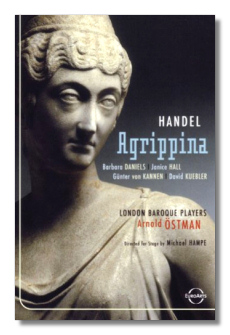
The Internet's Premier Classical Music Source
Related Links
- Handel Reviews
- Latest Reviews
- More Reviews
-
By Composer
-
Collections
DVD & Blu-ray
Books
Concert Reviews
Articles/Interviews
Software
Audio
Search Amazon
Recommended Links
Site News
 DVD Review
DVD Review
George Frideric Handel

Agrippina
- Günter von Kannen (Claudio)
- Barbara Daniels (Agrippina)
- David Kuebler (Nerone)
- Janice Hall (Poppea)
- Claudio Nicolai (Ottone)
- Carlos Feller (Lesbo)
- Ulrich Hielscher (Pallante)
- Eberhard Katz (Narciso)
London Baroque Players/Arnold Östman
EuroArts DVD 2054538 154min LPCM Stereo Dolby Digital DTS Full Screen
Here's a story which was a popular one in operas even before the time of Handel, but Handel's take on it – or rather, that of his librettist Vincenzo Grimani – is rather less tragic than, for example, Monteverdi's L'Incoronazione di Poppea. Everyone is still alive when the final curtain comes down, and perhaps wiser, although probably not better! This opera concerns Agrippina, Claudio's (Claudius's) wife, and her efforts to install Nerone (Nero), her son by a previous marriage, on the Roman throne. Poppea, a "Roman lady" who is loved by Claudio, Nerone, and Ottone (Otho) shows that she is no less calculating than Agrippina, and so the men in this opera are led by their noses by these two scheming women. The opera was a huge success for Handel, still in his twenties, during his sojourn in Italy, and it set the stage for future operatic triumphs in England. As was the practice during the time, Handel reused already written arias in Agrippina – some will be familiar from his Italian cantatas. This need not bother us, because the music is consistently superb, and a veritable encyclopedia of all that Handel already was capable of at this time. After just a few years in Italy, he had mastered his craft as a vocal composer, and the infectious buoyancy of this score – even in the more serious arias – cannot be resisted.
This production comes from the 1985 Schwetzinger Festival in Cologne, Germany. The year is significant, as it was the 2000th anniversary of the city's founding, and director Michael Hampe honors that anniversary by slightly changing the opera's ending: Claudio sends Ottone off to newly conquered Germania to found Colonia Agrippina. (In so doing, Claudio appeases his wife and leaves the door open to further dalliances with Poppea, who was given to Ottone in marriage just a few moments earlier.) Hampe's eye-pleasing production does not try to imitate Roman culture in the years before the birth of Christ. Instead, the costuming and set designs are more typical of Handel's time. Also, as a concession to modern tastes (at least as they were in 1985!), the castrato roles of Nerone and Narciso are sung by men, as is the formerly female role of Ottone. Hampe does not ignore the incipient humor in much of Agrippina, but he doesn't overdo it, and he is lucky to have fine singing-actors in the roles of Claudio (the wonderfully pompous Günter von Kannen), his servant Lesbo (Carlos Feller), and Ottone (Claudio Nicolai). In the title role, Barbara Daniels also responds to the comic potential of the scene in Act Two in which she is (quite unwillingly) romanced by her husband, who actually is on his way to a date with Poppea. Hampe's production shows that the ancient Romans were just as entertaining as an episode of I Love Lucy or a sketch on The Carol Burnett Show.
As Poppea, Janice Hall is assigned some of Handel's most florid writing, and she brings it off gorgeously, all the while managing to look both sweet and conniving. Barbara Daniels's Agrippina is a blonde gorgon just back from the hairdresser, and with a powerful voice to boot. David Kuebler brings a heroic touch to Nerone, and copes well with Handel's ornate divisions. As Claudio, Günter von Kannen is saturnine in both figure and voice. The smaller roles are strongly cast, and Arnold Östman and the London Baroque Players play up a storm.
Although more than 20 years old, the sound (in all three standard formats) and picture (4:3) seem fresh off the vine, and the English subtitles are more than adequate. There are no extra features on this DVD.
As the first Venetian audiences exclaimed, "Viva il caro Sassone" ("Hurray for our dear Saxon"). "Viva," also, to this enjoyable if not overly authentic production of Agrippina.
Copyright © 2005, Raymond Tuttle




















